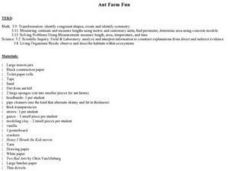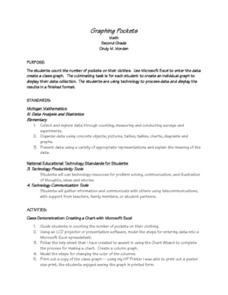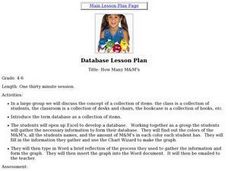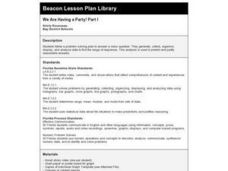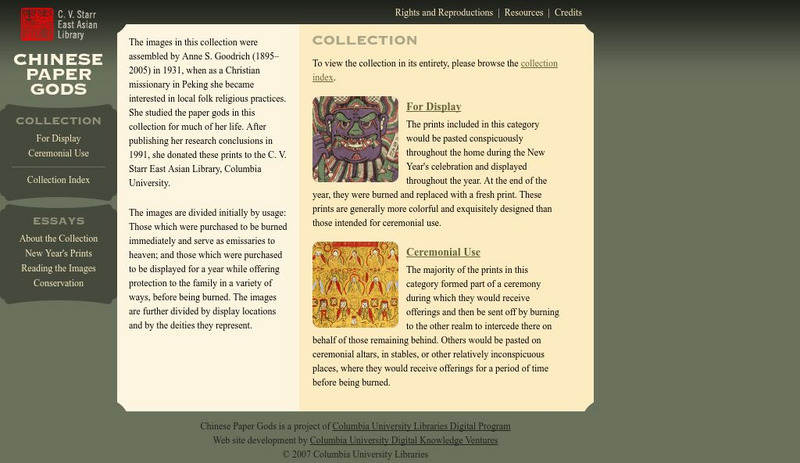Curated OER
M & M Madness
M&M's are always a great manipulative to use when teaching math. In this graphing lesson plan, learners predict how many of each color of M & M's there are. They count up each color and plug the data into a graph using the...
Curated OER
Bugs, Bugs, Everywhere!
Young scholars collect and compare bugs using magnifying lenses and graph data based on their comparisons. In this bugs lesson plan, students also make an aspirator by using a jar, tubing, and screen.
Curated OER
Sampling Rocks
Students collect and sort rocks based on visible characteristics. In this statistics lesson, students determine adequate sample size and categorize rocks based on characteristics. The book Everybody Needs a Rock is read to...
Curated OER
Images of Secession
Analyze political cartoons and historical events. Middle schoolers utilize primary resources to increase their comprehension of the topic of secession. They utilize graphic organizers to take notes, compare, and analyze political...
Curated OER
Jellybean Graphs
Second graders predict and graph data based on the color of jelly beans they think are in a handful. In this prediction lesson plan, 2nd graders will predict how many of each color jellybean are in a handful. Then they graph these...
Curated OER
M & M Madness
Second graders graph M & M's by color. In this graphing lesson plan, 2nd graders first predict how many of each color they think are in a handful of M & M's. Then they graph the amounts of each color on a computer program....
Curated OER
Circle Graphs
In this circle graphs worksheet, students solve 10 different problems that include reading various circle graphs. First, they use graph 1 to determine how many students preferred which sport. Then, students use graph 2 to determine the...
Curated OER
Ant Farm Fun
Third graders investigate ants and anthills in this series of lessons. They create their own Ant Farm.
Curated OER
INSECTS
Seventh graders select, collect, and classify various insects by constructing an apparatus from materials that aid in the capture and containment of the insect.
Curated OER
Word Problem Solving Strategies
For this word problem strategy worksheet, students solve and complete 11 statements related to solving a word problem in steps. First, they determine what is needed and what is important in the problem. Then, students explain how they...
Curated OER
Graphing Pockets
Second graders explore graphing. They count the number of pockets on their clothes and use Microsoft Excel to enter their data. Students create a class graph displaying their findings.
Curated OER
An Introduction to Collecting:
Young scholars create webs about collecting and classify ideas into categories . Students develop rationales for collecting from an artist's perspective, Young scholars collect and present objects based upon assigned criteria. ...
Curated OER
Make a 1000
Second graders work in pairs to decide on a collection idea. They are to record how they are going to collect the items (from home or from school) and how they are going to display the items to share with others.
Curated OER
How Many M&M's
Students explore sets and collections. Students find the colors of M&M's and the amount of M&M's each student has. They organize this information into an Excel spreadsheet. Students use the chart wizard to create a graph.
Curated OER
Bookbag Ideas: Collection -- Part 2
Pupils create their own bookbags to fill with books. They are to use the bookbags to take home books to read with their parents.
Curated OER
We Are Having a Party! Part I
Second graders use data analysis skills in order to plan a class party. They graph possible times for the party noting the range for times. They discuss how mathematicians find and use the range to analyze data.
Columbia University
Columbia University Libraries Digital Program: Chinese Paper Gods
From the Columbia University Libraries Digital Program, this is an online article discussing the Anne S. Goodrich collection of Chinese Paper Gods donated to the nuniversity.
PBS
Pbs Learning Media: No Nonsense Grammar Collection
In this No Nonsense Grammar Collection, students explore a range of commonly taught grammar principles for elementary and middle schoolers with these short, fun videos and activities. From the difference between dependent and independent...
Texas Education Agency
Texas Gateway: Data Organization
Given field and laboratory scenarios and laboratory data, students will construct data tables and graphs, using repeated trials and means to organize data.
National Institute of Standards and Technology (NIST)
Dictionary of Algorithms and Data Structures: Array
The definition of an array data structure with links to array subtopics.
Other
Career Foundry: How to Conduct User Experience Research Like a Professional
Find out about user experience research using these data collection tips.
Other
Hub Spot: How to Create a Survey in Excel, Word, Google, Facebook, & Survey Monkey
Learn how to create a survey in Excel, Word, Google, Facebook, and SurveyMonkey.
Other
Isaac Asimov's Foundations Universe
This site offers art work centered around the futuristic world created by Asimov (1920-1992 CE) and continued by several other sci-fi writers.









